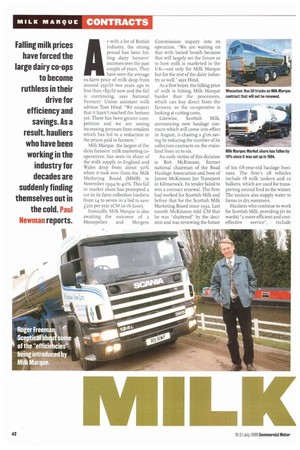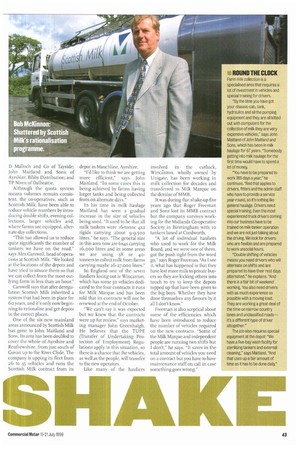Falling milk prices have forced the large dairy co-ops to
Page 44

Page 45

If you've noticed an error in this article please click here to report it so we can fix it.
become ruthless in their drive for efficiency and savings. As a result, hauliers who have been working in the industry for decades are suddenly finding themselves out in the cold. Paul Newman reports. As with a lot of British industry, the strong pound has been hitting dairy farmers' incomes over the past couple of years. They have seen the average ex-farm price of milk drop from around 25p/lit two years ago to less than r8p/lit now and the fall is continuing, says National Farmers Union assistant milk advisor Tom Hind: "We suspect that it hasn't reached the bottom yet. There has been greater competition and we are seeing increasing pressure from retailers which has led to a reduction in the prices paid to farmers."
Milk Marque, the largest of the dairy farmers' milk marketing cooperatives, has seen its share of the milk supply in England and Wales drop from about 5o% when it took over from the Milk Marketing Board (MM B) in November 1994 to 40%. This fall in market share has prompted a cut in its farm collection hauliers from 14 to seven in a bid to save L2m per year (CM to-r6 June).
Ironically, Milk Marque is also awaiting the outcome of a Monopolies and Mergers Commission inquiry into its operation. "We are waiting on that with baited breath because that will largely set the future as to how milk is marketed in the UK—not only for Milk Marque but for the rest of the dairy industry as well," says Hind.
As a first buyer, the falling price of milk is hitting Milk Marque harder than the processors, which can buy direct from the farmers, so the co-operative is looking at cutting costs.
Likewise, Scottish Milk, announcing new haulage contracts which will come into effect in August, is chasing a Lim saving by reducing the number of its collection contracts on the mainland from ro to six.
An early victim of this decision is Bob McKinnon, former national chairman of the Road Haulage Association and boss of James McKinnon J nr Transport in Kilmarnock. Its tender failed to win a contract renewal. The firm had worked for Scottish Milk and before that for the Scottish Milk Marketing Board since 1932. Last month McKinnon told CM that he was "shattered" by the decision and was reviewing the future
of his 68-year-old haulage business. The firm's 28 vehicles include 18 milk tankers and ro bulkers, which are used for transporting animal feed in the winter. The tankers also supply water to farms in dry summers.
Hauliers who continue to work for Scottish Milk, providing (in its words) "a more efficient and costeffective service", include
D Malloch and Co of Tayside; John Maitland and Sons of Ayrshire; Bibby Distribution; and TP Niven of Dalbeattle.
Although the quota system means volumes remain consistent, the co-operatives, such as Scottish Milk, have been able to reduce vehicle numbers by introducing double shifts, evening collections, larger vehicles and, where farms are equipped, alternate-day collections.
"This has allowed us to reduce quite significantly the number of tankers we have on the road," says Alex Carswell, head of operations at Scottish Milk. "We looked at the locations of the depots and have tried to situate them so that we can collect from the most outlying farm in less than an hour."
Carswell says that after deregulation Scottish Milk inherited a system that had been in place for Go years, and it's only now beginning to rationalise and get depots in the correct places.
One of the six new mainland areas announced by Scottish Milk has gone to John Maitland and Sons. Its area has been doubled to cover the whole of Ayrshire and Renfrewshire, from just south of Govan up to the River Clyde. The company is upping its fleet from 26 to 35 vehicles and runs the Scottish Milk contract from its
depot in Mauchline, Ayrshire.
"I'd like to think we are getting more efficient," says John Maitland. "In some cases this is being achieved by farms having larger tanks and being collected from on alternate days."
In his time in milk haulage Maitland has seen a gradual increase in the size of vehicles being used. "It used to be that all milk tankers were s6-tonne 4x2 rigids carrying about 9-9,500 litres," he says. "The general size in this area now are 6x4s carrying 16,000 litres and in some areas we are using 38 or 40ton ners to collect milk from farms carrying maybe 26-27,000 litres."
In England one of the seven hauliers losing out is Wincanton, which has some 50 vehicles dedicated to the four contracts it runs for Milk Marque and has been told that its contracts will not be renewed at the end of October.
"We can't say it was expected but we knew that the contracts were up for review," says marketing manager John Greenhalgh. He believes that the TUPE (Transfer of Undertaking Protection of Employment) Regulations apply in this situation, so there is a chance that the vehicles, as well as the people, will transfer to the new operators.
Like many of the hauliers
involved in the cutback, Wincinton, wholly owned by Unigate, has been working in milk collection for decades and transferred to Milk Marque on the demise of M MB.
It was during that shake-up five years ago that Roger Freeman and Sons lost its MMB contract but the company survives working for the Midlands Co-operative Society in Birmingham with so tankers based at Curdworth.
"A lot of individual hauliers who used to work for the Milk Board, and we were one of them. got the push right from the word go," says Roger Freeman. "As I see it, what has happened is that they have lost more milk to private buyers so they are kicking others into touch to try to keep the depots topped up that have been given to the big boys. Whether they have done themselves any favours by it all I don't know."
Vreeman is also sceptical about some of the efficiencies which have been introduced to reduce the number of vehicles required on the new contracts. "Some of the Milk Marque and independent people are running two shifts but I don't,' he says. "It saves in the total amount of vehicles you need on a contract but you have to have maintenance staff on call in case something goes wrong."












































































































